Kelli Russell Agodon's Blog, page 8
September 3, 2015
Postcard from Margaret Atwood
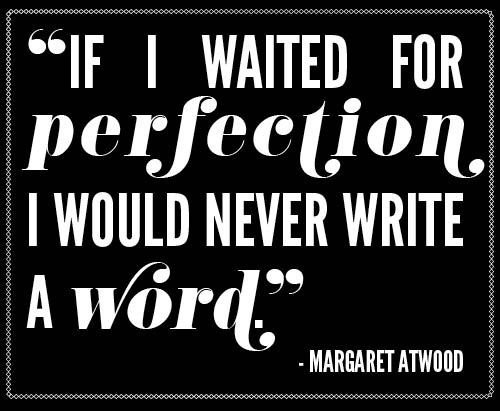
~ Kells
Want more on creativity, literary news & opportunities, and a glimpse into the literary life?
Sign up for Electronic Postcards:
an Every-So-Often Newsletter to inspire creativity sent directly to your Inbox
or
Don't miss a blog post: Subscribe to Book of Kells Blog by Email
_________________
Connect with Kelli Russell Agodon & Two Sylvias Press here:
Follow on:




www.agodon.com
www.twosylviaspress.com______________________________________________________________________Kelli Russell Agodon
www.facebook.com/agodon








Published on September 03, 2015 07:49
August 27, 2015
Postcard from Rumi:
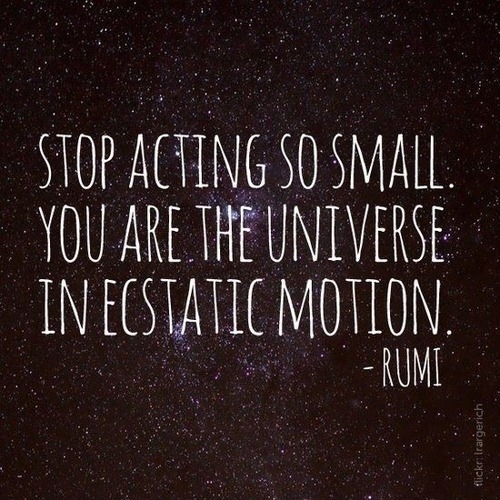
~ Kells
Want more on creativity, literary news & opportunities, and a glimpse into the literary life?
Sign up for Electronic Postcards:
an Every-So-Often Newsletter to inspire creativity sent directly to your Inbox
or
Don't miss a blog post: Subscribe to Book of Kells Blog by Email
_________________
Connect with Kelli Russell Agodon & Two Sylvias Press here:
Follow on:




www.agodon.com
www.twosylviaspress.com______________________________________________________________________Kelli Russell Agodon
www.facebook.com/agodon








Published on August 27, 2015 07:42
August 20, 2015
Postcard from Sylvia Plath
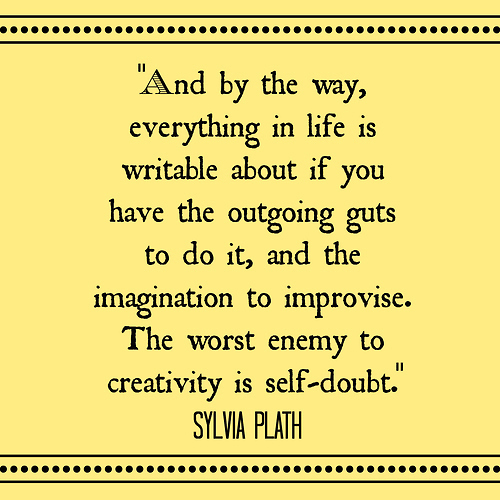
~ Kells
Want more on creativity, literary news & opportunities, and a glimpse into the literary life?
Sign up for Electronic Postcards:
an Every-So-Often Newsletter to inspire creativity sent directly to your Inbox
or
Don't miss a blog post: Subscribe to Book of Kells Blog by Email
_________________
Connect with Kelli Russell Agodon & Two Sylvias Press here:
Follow on:




www.agodon.com
www.twosylviaspress.com______________________________________________________________________Kelli Russell Agodon
www.facebook.com/agodon








Published on August 20, 2015 07:47
August 19, 2015
Once, as living things, we protected each other. Let these dogs be a reminder of that--
A lot of sadness in this photo, but a lot of beauty as well.
Once, as living things, we protected each other. Let these dogs be a reminder of that--

From Facebook:
"This one got me in the feels. Lots of destruction and sadness in the Kamiah area - I found this dead fawn [yesterday] morning. An hour later this sheep dog and her 2 pups are here protecting it. They have been here for hours and won't leave - barking at people that come near (although they are very nice)." - Louis Armstrong. He says the dogs protected the fawn for at least 13 hours.
Posted by Big Country News Connection on Tuesday, August 18, 2015
_________________
Connect with Kelli Russell Agodon and Two Sylvias Press here:
Follow on:




www.agodon.com
www.twosylviaspress.com______________________________________________________________________Kelli Russell Agodon
www.facebook.com/agodon








Published on August 19, 2015 10:09
August 13, 2015
Postcard from James Joyce
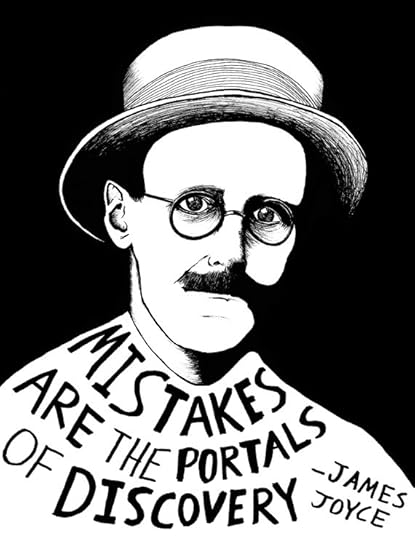
(By Ryan Sheffield, buy the print here.)
~ Kells
www.agodon.com
www.twosylviaspress.com
Want more on creativity and the literary life? -- Subscribe by Email
Kelli Russell Agodon
www.facebook.com/agodon








Published on August 13, 2015 07:46
August 11, 2015
Measuring Success as a Writer or Artist: A Basic Guide to Happiness
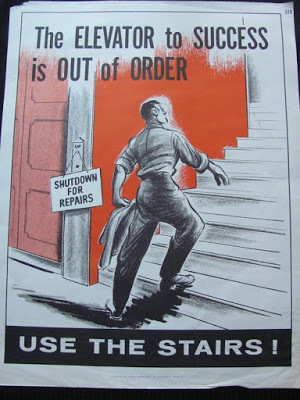
In America, sometimes we confuse “success” with monetary wealth. We think people who make more money are more successful and even happier.I have always said, There are many ways to be rich, money is just one of them.Money seems to be the easiest way to measure success for many people, but it’s not accurate. Freelance writer, Kristin Wong wrote, Money is a tool, not an ideal. Money is a tool we can use to buy things we need or want, but having more of it than another person doesn’t mean someone is successful, perhaps it just means they are better at hoarding.As writers and artists, we need to shift our belief that money = success. We’re creative people and we need to look more creativity at success. For me, the best thing money buys is freedom — freedom to make your own decisions. But frugality can buy that too. As living more simply can. Or being your own boss. Or not believing you have to live like other people. If we believe money = success than we have given our happiness and our success to a number. Which brings me to my next guideline:Never define your self-worth by a number.As poets, writers, and artists, we must not measure success in numbers — the number of poems published, the number of books written, how much money we make, the amount in our bank account, or even the number of items on our creative resume.Success is greater than that.Success as a writer or artist is creating something from nothing. It’s adding a little beauty to the world or being part of a larger conversation. Sometimes success is beginning a project. Sometimes it’s finishing. Sometimes success is losing track of the hours you spent revising a poem or teaching someone else how to paint.The key to unhappiness is to compare yourself to others.
Poets, writers, and artists make their own paths in the world and each path is unique. We have to look at our lives and goals, then carve our own path from our unique inner vision of the life we want to live. Unlike other careers or professions, there is no single way to arrive as a writer or artist. We become one by doing. And just as in making our own paths as creative people in the world, we have to determine what is important to us.In my life, I value time. I would much rather make less money and be able to create my own schedule — in life and work. I want to choose the hours I work, what I do, and who I do it for. Eventually, I may be rewarded in dollars for my investment in myself, or I may not. But I’m choosing. The views of our own success should be determined by things we can control and our own actions. It should be considered a success to wake up and write a poem. It should be considered a success to send your short story to a magazine. It should be considered a success to share your artwork online.Emily Dickinson never saw the success of her poems nor did Vincent van Gogh in regards to his paintings. But now they are viewed as geniuses in their field, their work is collected and they are admired by many.
Most of us will never know the “value” of our work on others’ lives, nor how what we have made may have affected others. We write, we paint; we put our work out in the world hoping it finds someone who falls in love with it. Many times, we never know what our work means to anyone. We never know who holds the book in their lap or who saw our painting hanging in a coffeeshop and was moved by it.Creating art is a hopeful, optimistic act.As writers and artists, success may feel like the images you see at a 3D movie — it’s out in front of you, but it never seems you can grasp it. One reason is that our idea of “success” is always changing. When a writer first starts out, success is publishing a poem or story, then two poems or stories, then a book, and it continues. The problem with this is we are allowing our happiness to be controlled by others and based on an outcome and not an action.How do I define my success? For me, success is living the life of a writer, editor, and an artist in the world. It’s being kind and open. It’s trying new things in life and in my work. It’s not judging others or believing I’m better than anyone or that anyone is better than I am. Success is being part of the literary conversation and not being distracted by the parts of life that don’t add to my art. Success is writing a poem. Success is arriving to the blank page unsure if I have anything to say.Success is the trust that what we’re creating matters and will have some positive impact on the world — maybe in ways we will never see or know. Success is believing this act of creating is what we should be doing. Trust that.
~ Kells
Want more on creativity, literary news and opportunities, and a glimpse into the literary life?
Sign up for Electronic Postcards:
an Every-So-Often Newsletter to inspire creativity sent directly to your Inbox
or
Don't miss a blog post: Subscribe to Book of Kells Blog by Email
_________________
Connect with Kelli Russell Agodon and Two Sylvias Press here:
Follow on:




www.agodon.com
www.twosylviaspress.com______________________________________________________________________Kelli Russell Agodon
www.facebook.com/agodon








Published on August 11, 2015 00:10
August 6, 2015
Postcard from Kurt Vonnegut
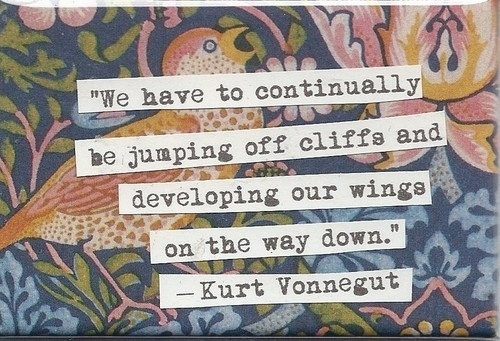
~ Kells
www.agodon.com
www.twosylviaspress.com
Want more on creativity and the literary life? -- Subscribe by Email
Kelli Russell Agodon
www.facebook.com/agodon








Published on August 06, 2015 07:48
July 30, 2015
Postcard from Anne Lamott
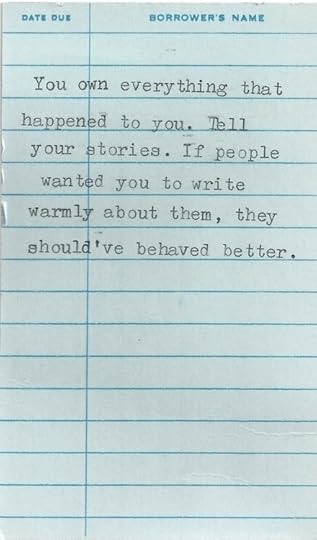
Anne Lamott from her book, Bird By Bird
(HIGHLY recommended for writers!)
~ Kells
Want more on creativity, literary news & opportunities, and a glimpse into the literary life?
Sign up for Electronic Postcards:
an Every-So-Often Newsletter to inspire creativity sent directly to your Inbox
or
Don't miss a blog post: Subscribe to Book of Kells Blog by Email
_________________
Connect with Kelli Russell Agodon & Two Sylvias Press here:
Follow on:




www.agodon.com
www.twosylviaspress.com______________________________________________________________________Kelli Russell Agodon
www.facebook.com/agodon








Published on July 30, 2015 07:45
July 23, 2015
A New Book & Favorite Poem from Martha Silano
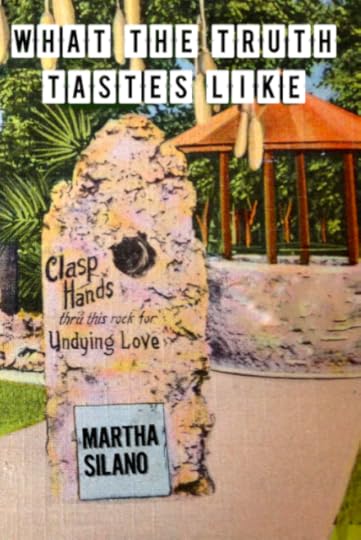
LADYBUG
When she reaches the endOf a shoe or a table, she keepsWalking. If she needs the help of wings,Wings appear. If she lands on her back,Her hind legs find the world and turn her Over. When the wings forget to fold,They drag like a slip from a scarlet dress.
Where did this one in my kitchen come from? Did a neighbor, in a fit of aphid rage,Release a thousand? Is this a sign?Am I to count the spots?
Time Teller, Child Bringer,Pursuer of Missing Sheep:What will be next?Predacious diving beetles?Scarabs named Goliath?Bombardiers that shoot a puff of gas?Don’t uninvited guests bring relatives?
But God’s Almighty Cow,Marienkäfer and Kin to Hen and Dove,How can I kick you out?
Girls put you on the tips of their fingers.
Where you fly they’ll meet a spouse.Cousin to Whirligig, Sharer of PartsWith the Snouted Weevil, is this the homeWhere you thought you’d find
Your children? Whoever sang to you lied.
by Martha Silano
From: WHAT THE TRUTH TASTES LIKE
~ Kells
Want more on creativity, literary news & opportunities, and a glimpse into the literary life?
Sign up for Electronic Postcards:
an Every-So-Often Newsletter to inspire creativity sent directly to your Inbox
or
Don't miss a blog post: Subscribe to Book of Kells Blog by Email
_________________
Connect with Kelli Russell Agodon & Two Sylvias Press here:
Follow on:




www.agodon.com
www.twosylviaspress.com______________________________________________________________________Kelli Russell Agodon
www.facebook.com/agodon








Published on July 23, 2015 07:37
July 18, 2015
How Poetry Book Contests are like Blind Dates: How To Make a Good Impression
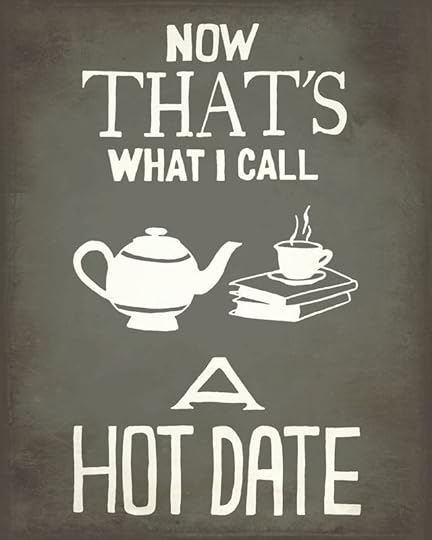
I am finishing up reading submissions for the Two Sylvias Press Chapbook Contest and am amazed and impressed with how much good writing is out there.
Yes, you always hear the opposite--the terrible poets and their terrible poems. But let's just say after my first read-through of chapbook entries, I was left with a huge batch of "semi-finalists" before I brought it down to my top 15 (as I write this, I am STILL not down to my top 15--there is so much I like).
And this may sound odd, but in many ways, judging a chapbook contest is a little like going on blind dates and I've learned more and more, how to have your manuscript make a good impression. So taking a nod from "How to Have a Great First Date," here are some ideas that I hope will help you
1) Make a Good First Impression:
If you arrived on our first date and said to me, a 40-something year old woman, "Hello Sir," I would not be pleased. But in reading poetry submissions, I have received so many cover letters with this greeting. (Spoiler alert: not every editor or judge is a man.)
Take a few moments to get to know the press & judge you are submitting to, otherwise it can look as if you didn't do your homework, which can look like you really don't care.
At Two Sylvias Press, both editors are women and our judge this year, Keetje Kuipers, is also a woman. Our names are all over the website and contest page. If you are unsure who is reading (though usually, it's the editors of the press and/or the contest judge) and you want to go generic, at least start with "Dear Editors" and don't assume gender.
2) Be A Good Listener:
Submit your manuscript exactly as the guidelines specify. If they ask for Table of Contents, include one. If they ask for acknowledgments, include that too. Don't worry too much about the formatting, if you're chosen, the press will take care of that to their specifications. Just keep it neat, accurate, and clean (just as your appearance on a first date would hopefully be).
3) Continue to Make a Good Impression:
If you arrived on our first date with a misspelled word across your chest or a holding a bunch of photos of yourself, I may not be too impressed. But some cover letters and manuscripts come with misspellings, big mistakes, and strange photos, some even come with ads to buy the poet's book.
Keep it professional. We haven't even met yet, so don't be too casual. Don't use a "special font" --that's like too much perfume. Or put your cover letter or manuscript in a special color font because it will stand out, but in that bad way, the same way I wear socks with sandals-- I'm getting attention, but for all the wrong reasons.
4) Keep the Conversation Interesting:
I will be upfront in saying that I have failed at this many times. I'm shy with people and presses that I admire. I become quiet and strangely awkward.
When I'm writing a cover letter to a press, sometimes I keep it too lean, too stale, and too boring. When writing a book of poems, many times I put my most interesting or vulnerable in the middle of my book. Why? Because they feel safe there. I'm a little guarded, you need to know me before I start sharing.
But in poetry contests, that doesn't always work well for the poet.
Many times, the editors and judges are so overwhelmed with submissions and can have 2 feelings-- they want fall in love with a manuscript OR they want a reason to reject it.
Make sure your first poems are interesting and not "setting the mood." Think about if you were a judge/editor reading this book for the first time, what would you think?
Too many epigraphs?
Uninteresting title?
What's the very first line?
What's the very first words/line that introduces your manuscript to a reader?
And while you're at, make sure your cover letter is interesting too. For example, if you found out about our Two Sylvias Press contest or press because you had bought The Poet Tarot or one of our publications, let us know. Let the press know you are familiar with their work and what they are doing.
5) Be Your Best Self:
When you submit your work, submit the best version of the poem in the best order in the manuscript with the best title. Ultimately, it will come down to the poems, not where they were published, not your poetic resume, but the work itself.
For me, sometimes when I'm going back and forth about whether I feel a poem is strong enough for my manuscript, I have quote I fall back on: "When in doubt, leave it out." (Perfectionists out there, this is not a free pass to give up and say all your work is garbage and you shouldn't be writing anyway-- I mean, nothing is perfect, but within reason. If you have a poem that in your gut, you know isn't strong enough, then maybe leave it out. You can always add it back in at a later date.)
6) Little Things Do Matter:
Make sure you use an easy to read font (Times New Roman, Garamond, Calibri Rockwell, etc). If you're submitting in an MS Word format, chose a font you know comes with the basic software.
Personal notes to the press or editor *are* appreciated (nothing to weird like "You look real pretty on your website," but "I just purchased The Daily Poet from your press and I love how it inspires my work.")
Contact info on the cover letter, including phone number, best email, website, address, name.
Personal Turn Ons:
Speaking only for myself, here are some things I love seeing as a judge/reader--
An inviting opening poem.A manuscript that makes me want to keep reading.Poems that take risk in form, content, or style.If it's a chapbook, I love it HIGHLY themed and focused.Happy surprises-- not shocking, but surprising wordplay, intellect, even something clever.Easy on the eyes manuscripts (good font, good spacing, clean, crisp, well-organized, etc.)Wonderful titlesA sense that much care was taken with this manuscriptA sense of humor, vulnerability, honesty, insight, tight strong poemsAnything well-crafted on ANY topic can win me over. For me, it comes down to the craft of poem--not the topic or your past publications, but that the poem I'm reading is good.Just strong writing -- I don't need a fancy formatted manuscript, and I honestly even don't need you knowing exactly what you're doing--if you make a mistake while submitting, it's okay, I'll forgive you--I just need amazing poems and I'll forgive and forget all of it.
Person Turn Offs:
Boring first, second, and third poemTrying to be too whimsical The overly self-conscious manuscript (example: making oneself look like the hero or having the light fall ever so perfectly on your speaker, her hair is never mussed up)Preaching-to-the-choir poems (yeah, we know war/racism/hate/cancer/etc is bad--show us something we don't know)Separate documents when just one was asked forLinks to a bio or information, instead of a bio or the information that was asked forMissing the big picture--not really seeing the book as a whole or the larger poem, just a bunch of poems brought togetherSloppiness and no self-editing Manuscripts that are too long (see sloppiness and self-editing)
~ Kells
www.agodon.com
www.twosylviaspress.com
Want more on creativity and the literary life? -- Subscribe by Email
Kelli Russell Agodon
www.facebook.com/agodon








Published on July 18, 2015 09:49



